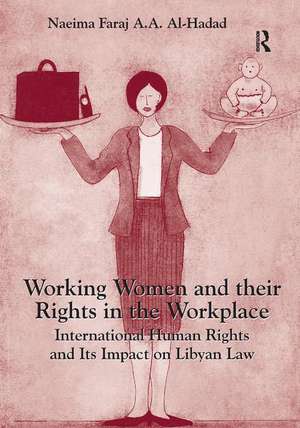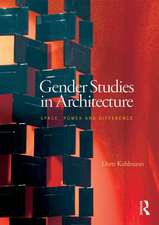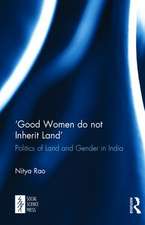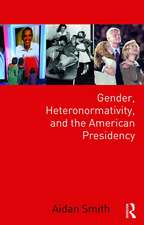Working Women and their Rights in the Workplace: International Human Rights and Its Impact on Libyan Law
Autor Naeima Faraj A.A. Al-Hadaden Limba Engleză Hardback – 28 feb 2015
| Toate formatele și edițiile | Preț | Express |
|---|---|---|
| Paperback (1) | 260.73 lei 6-8 săpt. | |
| Taylor & Francis – 30 iun 2020 | 260.73 lei 6-8 săpt. | |
| Hardback (1) | 767.74 lei 6-8 săpt. | |
| Taylor & Francis – 28 feb 2015 | 767.74 lei 6-8 săpt. |
Preț: 767.74 lei
Preț vechi: 1029.50 lei
-25% Nou
Puncte Express: 1152
Preț estimativ în valută:
146.90€ • 153.39$ • 121.31£
146.90€ • 153.39$ • 121.31£
Carte tipărită la comandă
Livrare economică 15-29 aprilie
Preluare comenzi: 021 569.72.76
Specificații
ISBN-13: 9781472444998
ISBN-10: 147244499X
Pagini: 264
Dimensiuni: 174 x 246 mm
Greutate: 0.65 kg
Ediția:1
Editura: Taylor & Francis
Colecția Routledge
Locul publicării:Oxford, United Kingdom
ISBN-10: 147244499X
Pagini: 264
Dimensiuni: 174 x 246 mm
Greutate: 0.65 kg
Ediția:1
Editura: Taylor & Francis
Colecția Routledge
Locul publicării:Oxford, United Kingdom
Cuprins
Working Women and their Rights in the Workplace
Notă biografică
Naeima Faraj A.A. Al-Hadad, is Assistant Professor in International Human Rights Law in the Department of Public Law, College of Law, University of Bahrain.
Recenzii
’This wonderful book brings together the best traditions of international human rights law and law and society scholarship to illuminate a topic of great importance. It is a major contribution to the ongoing struggle for full recognition of the rights of working women, in Libya and across the globe.’ Luke McNamara, University of Wollongong, Australia ’Who would have known that Libya under the late Muammar Gaddafi had produced an impressive array of laws and policies regarding working women and had signed most of the significant international treaties? In this impeccably researched study, Naiema Al-Hadad introduces us to the many laws pertaining to women, work, and family; shows the gaps between the national and international frameworks; and highlights inconsistencies, lax enforcement, and non-compliance. The rich interview data with working mothers elucidate the dilemmas they encounter in trying to balance work and family - dilemmas that are likely not to be resolved in the chaotic post-Gaddafi era.’ Valentine M. Moghadam, Northeastern University, USA 'A rigorous and lively study of women's rights is a rare and much appreciated experience. This is particularly the case where good national and international legal scholarship is combined with a deep cultural understanding and considerable research including interviews. Al-Hadad's book offers insights about and for law and legislation around women's rights in Libya but it is so rich in detail and insight it should be compulsory reading for all scholars interested in the struggle for women's rights across the world.' Diana Kelly, University of Wollongong, Australia
Descriere
This book addresses women’s rights to work and motherhood in Libya from a legal and international human rights perspective and considers how these two sets of rights, as protected under international human rights law, can and should be recognised and promoted within the Libyan legal system. The book includes first-hand accounts of experiences of Libyan women, assesses the adequacy of existing Libyan laws and, where warranted, offers proposals for legislative amendments to Libyan policy makers and its new Parliament at such a crucial time in the nation’s history.


















